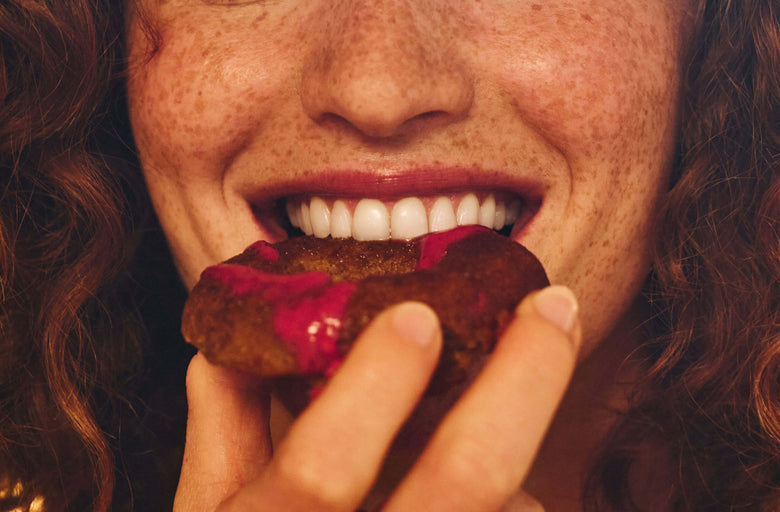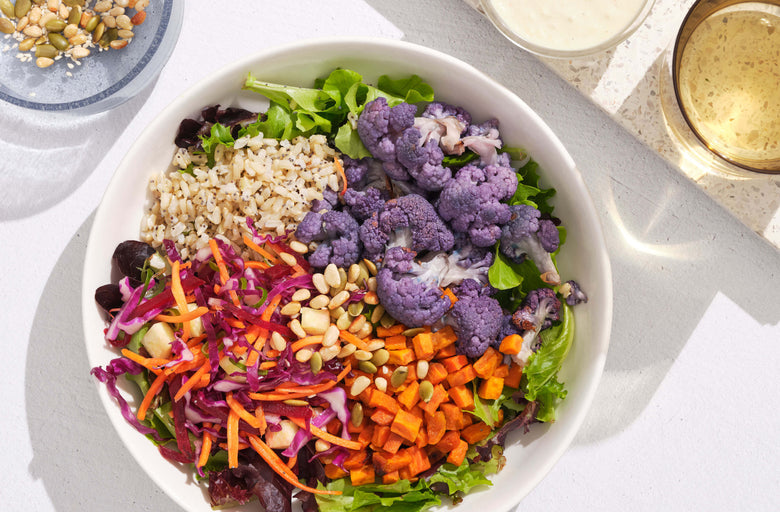Movement is a cornerstone of the holistic equation to feeling your best. There’s no greater feeling than finding a favorite mode to get physical. But whether you get your endorphin rush before rush hour, or are the last one at the gym, knowing what to eat before or after can be critical— and very confusing.
We tapped our circle of experts: MS and RDN, Keri Glassman; creator of NYC’s favorite new toning class, Sculpt Society, Megan Roup; and the wellness team at Sakara to provide you the insight and confidence for navigating this sporty snack query.
BEFORE YOU WORKOUT
FUEL YOUR PERFORMANCE | First, a quick lesson on macros: Carbohydrates are the body’s main source of energy. Protein is important for building and maintaining muscle and for muscle recovery. Fat can be used as energy during prolonged, low-intensity exercise. “Antioxidants, particularly flavonoids from fruits and vegetables counteract inflammation and muscle soreness and can help with muscle recovery,” says Glassman.
She also advises eating a combination of carbohydrates and protein before a workout which can help sustain your energy, preserve your muscle mass and speed recovery. Foods that are low in fat with moderate fiber are easier to digest and are less likely to cause gastrointestinal discomfort.
Early riser? You don’t always have to fuel before a big workout if you’re getting it in super early. Most importantly, listen to your body and take into account the workout and your goals. “A small ‘snack’ before like a small bowl of fruit, or a smoothie made with a plant-based protein powder might be the right thing for you,” says Glassman.
GET A SMALL JOLT | A boost of caffeine has been shown to heighten endurance and athletic performance. While for some that might mean coffee—Roup loves the ritual of a daily cup to kick off her morning workouts—for some, that can hinder hormone balance and even kick anxiety into overdrive. The combination of the nootropic l-theanine and caffeine, however, has been shown to improve both cognitive focus and attention, while reducing the strain on stress hormones.
CHANGE THE DIALOGUE | “Before a workout, [meditating and honing in on the goal of your workout] can reduce anxiety, clear your mind, and help with negative self-talk,” says Roup. “Changing the dialogue with yourself can set you up to enjoy your workout instead of trying to kill yourself in the class.“
AFTER YOU WORKOUT
NOURISH YOUR MUSCLES | “If you’re working out and going straight to work: plan accordingly. You do have to refuel for muscle formation,” says Glassman. “You want a combination of carbohydrates and protein—carbs to replenish muscle glycogen used during the workout and protein to prevent muscle breakdown and stimulate muscle synthesis.” She advises to remember a 4:1 ratio of carbs to protein, but this will depend on the individual and the workout. So go prepared! “I’ve never met a Sakara breakfast or bar I didn’t like,” says Glassman.
REPLACE FLUIDS | Hydration is key, but proper balance of electrolytes to water is even more critical for energy and athletic recovery. Prioritizing micronutrients and essential minerals will allow your body to function optimally before, during, and long after your sweat session. “I make sure after I workout I am drinking plenty of water, says Roup. “My goal is three liters a day.”
STRETCH AND RECOVER | Try and avoid leaving class or the gym (or the pavement!) without stretching afterward. Taking five minutes to foam roll or do a couple of slow, nourishing mobility movements can not only leave you feeling better for your next workout but lengthen your muscles. “Simple stretches can help with muscle recovery and prevent injury,“ advises Roup.
TAKE AN EPSOM BATH | “This is one of my favorite ways to recover after a long day or workout,” says Roup.” I find I’m instantly relaxed and I have reduced muscle soreness in the next day.”
Rev Up Your Energy






